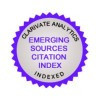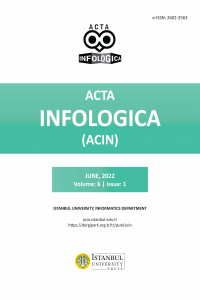Research Article
Aim & Scope
Author Guidelines
These instructions give you guidelines for preparing papers for Acta INFOLOGICA. Use this document as a template if you are using Microsoft Word 6.0 or later. Otherwise, use this document as an instruction set. Paper titles should be written in uppercase and lowercase letters, not all uppercase. Avoid writing formulas in the title. Do not write “(Invited)” or similar expression in the title. Full names of authors are preferred in the author field, but are not required. The abstract must be a concise yet comprehensive reflection of what is in your article. In particular, the abstract must be self-contained, without abbreviations or footnotes. It should be a microcosm of the full article. The abstract must be between 150–250 words. Be sure that you adhere to these limits; otherwise, you will need to edit your abstract accordingly. The abstract must be written as one paragraph, and should not contain displayed mathematical equations or tabular material. The abstract should include three or four different keywords or phrases, as this will help readers to find it. It is important to avoid over-repetition of such phrases as this can result in a page being rejected by search engines. Ensure that your abstract reads well and is grammatically correct. Keywords must be defined by taking into consideration authorities like “TR Dizin Anahtar Terimler Listesi”, “Medical Subject Headings”, “CAB Theasarus”, “JISCT, “ERIC”, etc. References should be prepared as APA 6th edition.
Ethical Principles and Publication Policy
Publication Ethics and Malpractice Statement
Acta INFOLOGICA (ACIN) is committed to upholding the highest standards of publication ethics and pays regard to Principles of Transparency and Best Practice in Scholarly Publishing published by the Committee on Publication Ethics (COPE), the Directory of Open Access Journals (DOAJ), to access the Open Access Scholarly Publishers Association (OASPA), and the World Association of Medical Editors (WAME) on https://publicationethics.org/resources/guidelines-new/principles-transparency-and-best-practice-scholarly-publishing
All parties involved in the publishing process (Editors, Reviewers, Authors and Publishers) are expected to agree on the following ethical principles.
All submissions must be original, unpublished (including as full text in conference proceedings), and not under the review of any other publication synchronously. Each manuscript is reviewed by one of the editors and at least two referees under double-blind peer review process. Plagiarism, duplication, fraud authorship/denied authorship, research/data fabrication, salami slicing/salami publication, breaching of copyrights, prevailing conflict of interest are unnethical behaviors.
Research Ethics
Acta INFOLOGICA (ACIN) adheres to the highest standards in research ethics and follows the principles of international research ethics as defined below. The authors are responsible for the compliance of the manuscripts with the ethical rules.
- Principles of integrity, quality and transparency should be sustained in designing the research, reviewing the design and conducting the research.
- The research team and participants should be fully informed about the aim, methods, possible uses and requirements of the research and risks of participation in research.
- The confidentiality of the information provided by the research participants and the confidentiality of the respondents should be ensured. The research should be designed to protect the autonomy and dignity of the participants.
- Research participants should participate in the research voluntarily, not under any coercion.
- Any possible harm to participants must be avoided. The research should be planned in such a way that the participants are not at risk.
- The independence of research must be clear; and any conflict of interest or must be disclosed.
- In experimental studies with human subjects, written informed consent of the participants who decide to participate in the research must be obtained. In the case of children and those under wardship or with confirmed insanity, legal custodian’s assent must be obtained.
- If the study is to be carried out in any institution or organization, approval must be obtained from this institution or organization.
- In studies with human subject, it must be noted in the method’s section of the manuscript that the informed consent of the participants and ethics committee approval from the institution where the study has been conducted have been obtained.
Author's Responsibilities
It is authors’ responsibility to ensure that the article is in accordance with scientific and ethical standards and rules. And authors must ensure that submitted work is original. They must certify that the manuscript has not previously been published elsewhere or is not currently being considered for publication elsewhere, in any language. Applicable copyright laws and conventions must be followed. Copyright material (e.g. tables, figures or extensive quotations) must be reproduced only with appropriate permission and acknowledgement. Any work or words of other authors, contributors, or sources must be appropriately credited and referenced.
All the authors of a submitted manuscript must have direct scientific and academic contribution to the manuscript. The author(s) of the original research articles is defined as a person who is significantly involved in “conceptualization and design of the study”, “collecting the data”, “analyzing the data”, “writing the manuscript”, “reviewing the manuscript with a critical perspective” and “planning/conducting the study of the manuscript and/or revising it”. Fund raising, data collection or supervision of the research group are not sufficient roles to be accepted as an author. The author(s) must meet all these criteria described above. The order of names in the author list of an article must be a co-decision and it must be indicated in the Copyright Transfer Form. The individuals who do not meet the authorship criteria but contributed to the study must take place in the acknowledgement section. Individuals providing technical support, assisting writing, providing a general support, providing material or financial support are examples to be indicated in acknowledgement section.
All authors must disclose all issues concerning financial relationship, conflict of interest, and competing interest that may potentially influence the results of the research or scientific judgment.
When an author discovers a significant error or inaccuracy in his/her own published paper, it is the author’s obligation to promptly cooperate with the Editor to provide retractions or corrections of mistakes.
Responsibility for the Editor and Reviewers
Editor-in-Chief evaluates manuscripts for their scientific content without regard to ethnic origin, gender, sexual orientation, citizenship, religious belief or political philosophy of the authors. He/She provides a fair double-blind peer review of the submitted articles for publication and ensures that all the information related to submitted manuscripts is kept as confidential before publishing.
Editor-in-Chief is responsible for the contents and overall quality of the publication. He/She must publish errata pages or make corrections when needed.
Editor-in-Chief does not allow any conflicts of interest between the authors, editors and reviewers. Only he has the full authority to assign a reviewer and is responsible for final decision for publication of the manuscripts in the Journal.
Reviewers must have no conflict of interest with respect to the research, the authors and/or the research funders. Their judgments must be objective.
Reviewers must ensure that all the information related to submitted manuscripts is kept as confidential and must report to the editor if they are aware of copyright infringement and plagiarism on the author’s side.
A reviewer who feels unqualified to review the topic of a manuscript or knows that its prompt review will be impossible should notify the editor and excuse himself from the review process.
The editor informs the reviewers that the manuscripts are confidential information and that this is a privileged interaction. The reviewers and editorial board cannot discuss the manuscripts with other persons. The anonymity of the referees must be ensured. In particular situations, the editor may share the review of one reviewer with other reviewers to clarify a particular point.
Price Policy
All expenses of the journal are covered by the Istanbul University. Processing and publication are free of charge with the journal. There is no article processing charges or submission fees for any submitted or accepted articles.
















